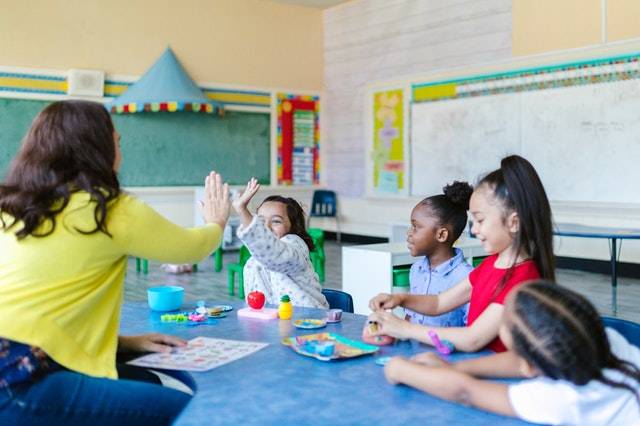How to Choose an Early Educator You Can Trust

The early years of education are extremely important in a child’s life. This is the time when children first start realizing their potential as individuals, start learning, and form their first impressions of classrooms and teachers.
A child’s cognitive, emotional, social, and academic development starts to blossom even further when families and educators work cooperatively.
When a child sees healthy relationships between early educators and their families, the child starts realizing that the important people in his life work cooperatively and trust each other, and he will do the same.
This kind of alliance between educators and parents can help provide a secure foundation for your young one’s well being and learning. This is why finding an early educator you can trust during your child’s formative years is so crucial.
If you’re searching for the perfect early educator for your child, here are some important traits to look for. We also discuss why they’re essential, and how you can tell whether an educator is suitable for your child by assessing their actions. Let’s get started!
An Educator that is Organized
Managing youngsters can be pretty chaotic at times. That’s why if you have to put your faith in an educator, you should always prefer an organized educator compared to someone who has no set plans.
Proper planning is the secret to good education. Organized teachers are always able to craft well-balanced lesson plans, routines, and curriculums, which results in a reduced mental load on you and your children.
You’ll notice that organized teachers often have an established approach to child care, well-running classrooms, the ability to handle difficult situations efficiently, and even a tendency to pass on their organizational skills to children.
Being Inclusive and Respectful
Early educators often have to work with youngsters from many different walks of life and backgrounds.
This diversity warrants early educators to be respectful, inclusive, and aware of each child’s needs, challenges, abilities, and values to ensure equal treatment.
For example, a good educator will try to make special efforts to give individuals with certain learning disabilities the same socialization, play, and learning opportunities as other children.
Another example of inclusivity is early educators taking the time and effort to become more aware of a child’s cultural roots by listening to their parents. It’s also important to make sure that certain activities and homework are easily accessible to kids from all socioeconomic classes.
By the way, if you’ve been struggling to get your child to do their homework, here’s what you can do.
Kind-hearted and Caring Approaches to Teaching
Kindness is an essential trait of a great early educator. A caring teacher consistently demonstrates concern for a child’s well being and seeks to nurture and comfort them.
A teacher who genuinely cares for kids shows empathy by taking their concerns and necessities seriously and offering them a safe space to express themselves fully.
A caring teacher also takes out time to understand children’s perspectives before reacting. All of this helps create a culture of care that teaches children the importance of empathy. Get started with an online course to learn and understand children’s perspective and their behaviors.
Enthusiastic Approaches to Education
The best teachers are those who are genuinely enthusiastic about their subject. Therefore, it comes as no shock that enthusiasm is one of the most essential qualities of a good early educator.
The love of learning is highly contagious, which is why an enthusiastic teacher can transfer their eagerness to their students. Studies also suggest that teacher enthusiasm is a powerful predictor of student success.
Good educators get children excited about learning by:
- Showing the value of what’s being taught by giving real-life examples
- Constantly reacting positively to signs of interest and curiosity
- Promoting student engagement by allowing children to make comments and ask questions
- Conveying knowledge in a passionate tone
Demonstrating Patience
Any group of children comprises diverse personalities and has varying interests, needs, and desires. Also, you can’t always expect children to behave as you’d like them to. This means that persistence and patience are vital qualities needed to be a successful early educator.
A patient educator realizes the extent of a student’s abilities and lets each child progress at his own pace. They are also more adaptable and don’t let small things bother them.
Setbacks are common, but a persistent teacher will always have the endurance to try out new and different strategies to overcome all obstacles and achieve set goals.
When an educator adopts a patient temperament, their students often follow. Children will start finding it much easier to relax and fall in love with learning, as they often take cues from their teacher’s go-getting attitude.
Excellent Communicators
Kids are sponges during their formative years but are also very new to classrooms. Any early educator must be able to easily communicate with young minds on their level, including breaking down complicated subjects into digestible pieces of information.
Early childhood educators should also be able to provide important details about class progress to parents to make them more aware of their kid’s achievements, skills, abilities, and academic performance.
Regular, purposeful, reciprocal interactions between parents and educators can allow both parties to know more about a child and his needs.
So make sure you choose someone who’s willing to communicate with you regularly! If you’re looking for more parenting tips, here are 15 tips to deal with your preschooler.

